FNATIC's Dreamhack destiny
The story of how five underdogs won the first major tournament in Counter-Strike: Global Offensive history.
This article was originally published on GameSpot's sister site onGamers.com, which was dedicated to esports coverage.
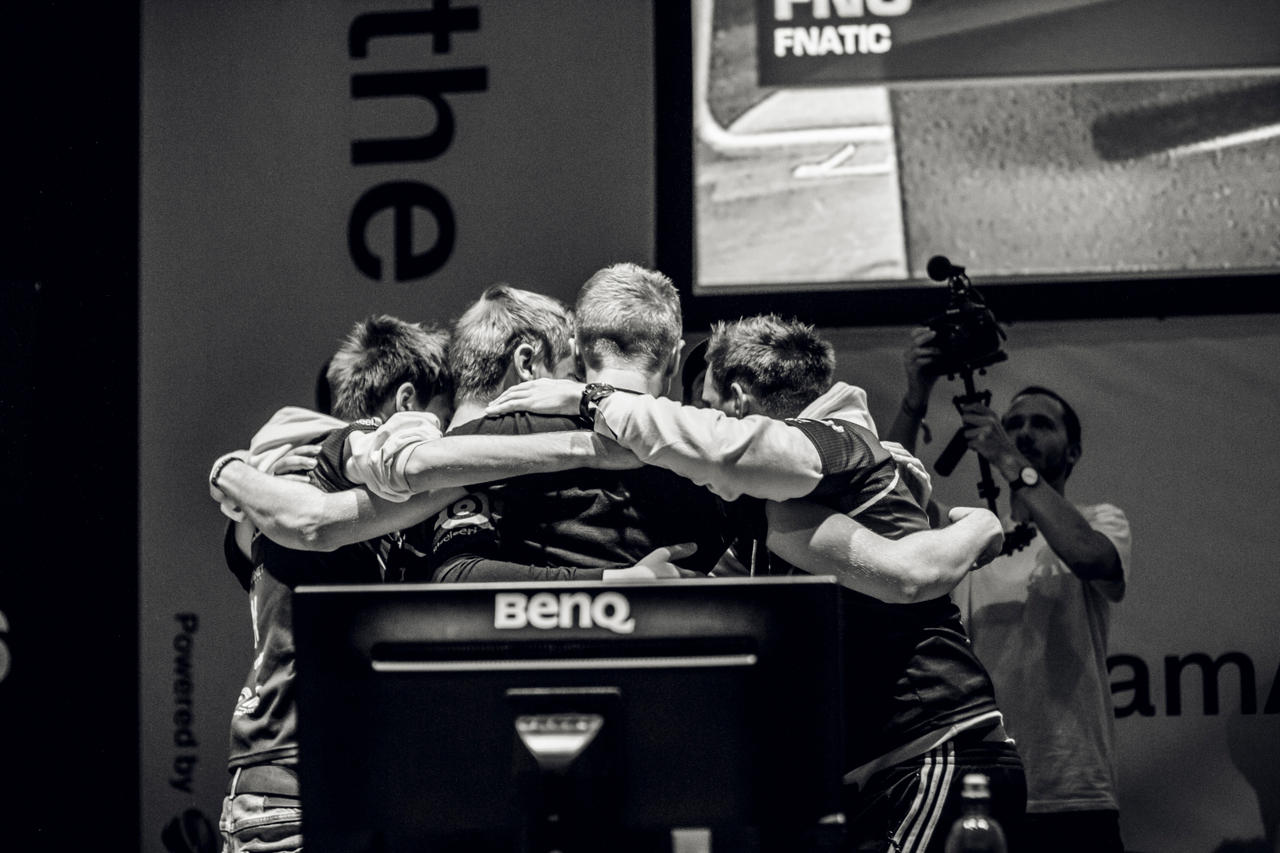
"Before the effect one believes in different causes than one does after the effect."
-Friedrich Nietzsche
On November 28th the Dreamhack SteelSeries Counter-Strike: Global Offensive Championship began play, two days later fnatic were crowned the champions of the first true world champions level event in the game's history and winners of $100,000. History had suggested that NiP or VeryGames, the two most successful teams in the history of CS:GO, were not only certain to finish the event with one of them as champions, but more than likely would decide the title between themselves. The two giants of the game did meet, do battle in epic fashion and send a representative to the finals, yet it was the underdogs of fnatic who came away with the crown.
This the story of five players who had never won a significant offline international tournament in their career. This is the story of four players who had met NiP in the Dreamhack Summer final, five months prior, and been summarily crushed underfoot by the best team in CS:GO history. The story of three players who handed NiP their first official online loss in CS:GO, but found themselves later dogged with a reputation for being at best onliners and at a worst outright cheaters.
This is the story of one man who turned opportunity away when it came knocking at his door again and again, until finally he answered that call and accepted a place as the leader of a young team in search of a calm mind to direct their actions. Finally, it's the story of how the most important moment in CS:GO produced a miracle worthy of the occasion. Following their victory I spoke to all five members of the FNATIC line-up to find out how, facing the team of history, an underdog delivered a final of destiny against all odds.
fnatic's Dreamhack SteelSeries CS:GO Championship winning line-up:
- Jesper 'jw' Wecksell
- Andreas 'schneider' Lindberg
- Robin 'flusha' Rönnquist
- Markus 'pronax' Wallsten
- Jonatan 'Devilwalk' Lundberg
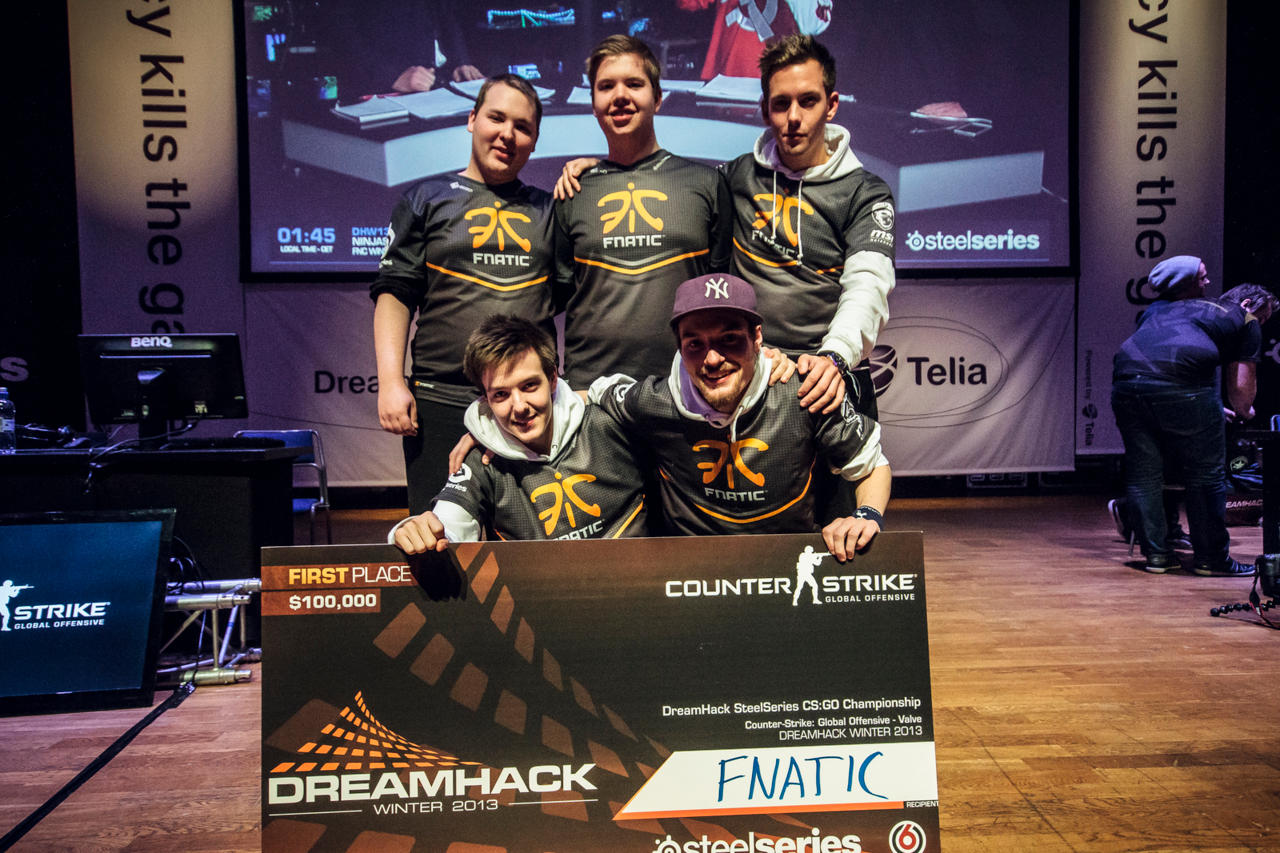
The days before we knew their names
The Swedish Counter-Strike 1.6 scene was always a vibrant one, however well the game did in other regions around the world. At the top end there were always at least two teams standing above the others (names like NiP, GoL, SK.swe, 9.esu and fnatic), then below them there would be one or two other teams (H2k, Giants, Begrip and so on) who worked almost like farm teams, with the brightest and most brilliant talents would then be scooped up by the big name teams.
Further down the ladder the scene began to branch out, splitting off into anywhere from two to five semi-pro level teams, players who were known and attended domestic LANs frequently, but were waiting for their shot in the second tier of Swedish sides. In this murky realm of players hustling to prove their value to those slightly above them in the scene, many a Swedish player put in years of play, some got their chance to move up a level of competition, others never did.
Three of the core members of the fnatic CS:GO team this story concerns (flusha, jw and schneider) were scrapping and earning their early stripes at the bottom end of this competitive Swedish semi-pro scene in 1.6. As far back as 2011 jw and schneider can be found competing with Gamerzone at the Swedish WCG qualifier. In 2012 all three took part in the numerous Swedish LANs held, getting the chance to face-off against international competition as well as domestic.
schneider and jw were members of the Hellslayers team which took a beating to NEO and TaZ's ESC Poland team in the 3rd Intel Core Challenge by Inferno Online tournament in May of 2012. A month later and flusha had joined up with them, playing in the Swedish Championship. To get an insight into the early days of this trio of players I searched out Andreas "maxAki" Andersson, someone who had played alongside jw and schneider in Hellslayers.
"My first memory of jw was that he was this kid no one wanted to play with because he was bad at the game, I think this was at the end of 2009. He had this lag and freaky noobish playstyle but he didn't really think like others, he rather tried to practice and push his limits instead of covering his weakness. I saw him online every day and I believe he was on constant 110-160hrs/2w for like two years. He was playing this much when I played with hGh. The thing was that everyone played playnation and when it had been popular for a year jw's team suddenly started to win the ladders and everyone thought they cheated. And they did, here is a clip of schneider on playnation
When jw got better at the game and felt that he got respect he started to behave immaturely. I think this mainly comes from the past when he was treated badly himself. He likes to joke around and do silly things and it's usually not really offensive, just funny in his eyes. When he started to play with samzter they asked me if I wanted to join their team and the lineup was jw, samzter, schneider, brownie and me.
This was after I busted schneider for cheating. One day when we played ESC (neo & co.) we sat down at burger king outside inferno-online and he actually told me that, yes, he had been cheating and he told me that he learned a lot from it because the silent aimbot isn't easy to manage, you need to know how it works and control it. He said that his normal gaming experience without improved as well because he knew how it felt to play with such self-confidence as if you had aimbot. I could understand it because it's easier to reach a flow when you have that belief in yourself.
When I joined a team like this, where I have four pretty immature guys, I always thought what I could do for them to help them think more maturely and teach them to concentrate and play seriously when it matters. I saw the potential in all of them but their mind to get the game wasn't a professional's, with this I mean that they could do a lot of stupid things like weird rushes which was really bad for the whole team but as individuals they wanted to push themselves."
-maxAki, speaking in 2013 about his time playing with jw and schneider in 2012.
Due to his prescence in the semi-pro scene, playing in tournaments and gathers, maxAki also got to know flusha from playing against him.
"I don't know about flushas start of the game but I know when he started to show that he had actually got talent. I clearly remember the gathers on Inferno because I loved to go house as T and get a fast peak. I was usually able to read the game very well and knew where to get my picks. I realised quickly though that flusha is always house as CT and got really stumped by his playing style, it was like he was reading my playing style and made traps for me to walk into. I think his strength is to lure players into his advantage doing things that normal players or casters don't realise about him. I was suspicious of his play but I don't judge anybody until they are proven guilty."
-maxAki, speaking in 2013 about flusha.
Beyond that initial team-up the members split up again, with jw playing with Aligon at ASUS Summer, while schneider and flusha qualified for Dreamhack Bucharest in a different line-up. At the Romanian event schneider attended with hatersG0nnahate (hGh). With that even being in October of 2012, CS:GO was just around the corner and all of the eventual fnatic members would play a role in the early scene of that game.
Making an early mark, for ill and for good, in Global Offensive
While the intial stars of Counter-Strike: Global Offensive, for obvious reasons, were the legacy stars from 1.6 and Source, it didn't take long for the members of the future fnatic to begin making a mark for themselves. September had seen NiP winning Dreamhack Valencia, the first true offline event for the game, and October was when most players started to jump into those waters.
jw's was actually featured as the star of the first highlight clip on HLTV.org, the main news site for Counter-Strike. The young Swede played in a team formed by maxAki called GOSU, winning byLAN in Norway. The same month Devilwalk, fusha and schneider won the Thor Open Qualifier #2, playing under the team name SY&b. While only an online qualifier, the tournament was significant in that SY&b were able to hand Ninjas in Pyjamas their first ever official loss in CS:GO. In the opening round of the qualifier they beat the elite Swedish side and champions of Dreamhack Valencia by 16:14 on dust2_se.
"When we saw that we were facing NiP in the first game, everyone was like: 'Yeah, sweet, now this day is ruined", but we got round after round, until we beat them."
-schneider, speaking to HLTV.org after winning the Thor Open Qualifier #2.
Two weeks later they joined up with the Western Wolves organisation. In mid November they placed third in the Dreamhack Winter qualifier, beating out ALTERNATE along the way. Around that time jw was playing in a team called WRTT, who had themselves been causing a stir with online upsets of established star names. In the sixth THOR Open Qualifier WRTT had managed to crushed NEO's ESC 16:0 and notch an upset win of their own over NiP, winning 16:11 over the Swedish CS:GO kings. The furor surrounding these upsets would not be over an underdog winning though, but accusations that jw had been cheating in the matches.
The story goes that the admins of the tournament reviewed the VODs of the games in question, but found nothing to directly implication anyone in cheating. The problem arose when viewers of jw's stream had asked him to search for a specific file, to see if he had been using cheating software. When he did so it brought up a file in which the text thanked jw, by his real name, for having purchased cheats. It didn't help matters that the player then deleted the VOD in question, but not before viewers had screenshoted the aforementioned.
On the basis of that VOD, and the circumstantial evidence contained within, the admins disqualified WRTT from the qualifier, instead moving ESC on in the competition to face the next opponents. At the time jw and his team made the claim that the text file had been a practical joke, but few, in light of their huge wins over established teams of legends, were in any mood to entertain that as a possibility. The team's reputation was set as one of being cheaters, a stain they would bear for some time to come.
First offline outings and more cheating accusations
Devilwalk, schneider and flusha's came close to getting their first LAN opportunity to compete with the big boys, making it all the way until the final stage of the Dreamhack Winter BYOC (Bring Your Own Computer) qualifier, only to fall 10:16 to pronax's Absolute Legends team. Two weeks later they got their chance for revenge, as at THOR Open they went 1-2 in the group stage, but their lone win was a 16:14 dust2 win over the very same Absloute Legends. Also in the same group said the team had narrowly lost out to Anexis (later in CS:GO history to be known as what would become the Danish Western Wolves team).
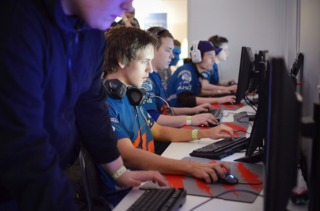
Within just over a week of THOR Open taking place the Western Wolves organisation had dropped the Swedish side, while jw's WRTT had found a home in Epsilon. At the end of January flusha had joined up with Epsilon, with schneider following in under a fortnight. Despite having two new players in their line-up the team formerly known as WRTT didn't do themselves and their reputations as online cheaters any favours by delivering a blistering week or so of form in the first RaidCall EMS One Cups. Winning the first and finishing second in the next, a number of pros in the scene still suspected the team of foul play, and fans weren't quick to forget the team's supposed past transgressions.
On the first of March Epsilon used Devilwalk and another player as stand-ins for an online tournament called The Nordic Games #2, winning the first prize of five tickets for Copenhagen Games. A few days later they released xelos, but their reputation haunted them as less than two weeks later the team was kicked from the rest of the EMS One Spring season and xelos was banned from ESL tournaments for two years. The team's results in the first two cups revoked, on the basis that the admins had decided xelos had been cheating.
Setting in place the four members of the future core
At exactly this same time Epsilon officially brought in Devilwalk and berg, finally putting in place the four man core of the team which would remain in Epsilon and on into the fnatic team which this story revolves around.
"I dont think there was a huge change in getting Devilwalk as we all had played with him a lot before, but it was probably the loss of xelos and Lox that made us get a lot better. I feel like Lox and xelos were not as serious about playing CS:GO as the rest of us and when we acquired Devilwalk and Berg we felt like we all got into the same mindset."
-flusha, speaking in December of 2013, on the addition of Devilwalk to Epsilon.
"The biggest thing that changed within the team when we got Devilwalk back then was that we, for the first time, actually had five players with the same goal and ambitions, as well as everyone had all the time in the world to make it happen. We all wanted to become a top team and become professional gamers. We had all wanted that since the 1.6 days."
-jw, speaking in December of 2013, on adding Devilwalk and berg to Epsilon.
Despite the weight of their online pasts hanging heavy upon them the team's Copenhagen Games tickets meant that at the end of March they'd had a chance to prove their worth in the offline doman, potentially against some of the teams they'd faced in those online cups. With the new line-up in place they quickly set to work training for the Danish tournament.
"We practiced pretty much every day, more than every team out there. We could practice maybe 2-3 hours extra per day compared to other teams. I feel like it didn't take long since flusha, schneider and I had previously played with the line-up that was the first to ever beat NIP (SY&B), and jw had a pretty free role in what he did. Lastly, berg was really good as what I call a "preparation IGL", which basically mean setting up rotation patterns, set-ups and strats, and since he was so good at that it took a lot less time in practice then it normally would."
-Devilwalk, speaking in December of 2013, on the preparation for Copenhagen Games.
Proving it offline
At Copenhagen Games Epsilon drew what should have been an impossible group, featuring fnatic and Natus Vincere. Both teams had been championship sides in 1.6 and had switched over in the last few months, with fnatic changing a single player and Na`Vi transitioning their entire four time major winning line-up.
Luckily, the format would be much more forgiving than most LAN tournaments. Firstly, the group stage would be Bo3 (Best-of-3), as opposed to the typical Bo1. Secondly, where in most offline CS tournaments a four team round robin group stage eliminates the bottom two placing teams in the group, this tournament instead put the bottom two teams into the lower bracket portion of the playoffs, while the top two of the group got to go directly into the upper bracket. With the upper bracket being double elimination and the lower bracket single elimination, that still gave the lesser teams little chance to survive, but it was still a chance.
In their opening game against fnatic, Epsilon immediately showed themselves to be more than just online superstars, narrowly losing in three maps. They had lost the opener 14:16 on mirage, won the second 16:12 on train and then just missed out on the decider, losing nuke 13:16. Any questions that this had been an anomaly were answered in the second group stage match, with Epsilon beat Na`Vi 2:1. Again they won train narrowly, again they lost mirage in a close affair but this time they won the decider, inferno, 16:13.
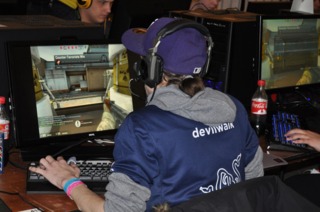
Epsilon had shown, at least in the group stage, that they were for real. They comfortably won the final series of the group to move into the playoffs in the upper bracket, having place second overall in the group, and forcing Na`Vi into the lower bracket. Moving past an easy first opponent the Swedes reached a match with the Danish Western Wolves, players for the organisation three of them had represented only three months prior. Despite winning the opening map they lost the next two by large scores, dropping them down to the lower bracket.
In the lower bracket Devilwalk and company moved through the bracket to reach a match with more 1.6 legends: the second golden five line-up of ESC, winners of an IEM and a WCG title in their final years of CS 1.6. Once more the Swedish rookies would collect the scalps of some 1.6 masters, winning out 16:14 on train to find themselves amongst the last remaining 12 teams in the tournament. Their run could go no further though, forced to battle VeryGames, considered the second best team in the world at that time, in the lower bracket, quickly being dispatched by the French titans.
Despite the final placing for Copenhagen Games being a mere 9th-12th, Epsilon had reasons to feel pride with their accomplishments, their bracket draw had meant they had only lost in the playoff portion to the teams who eventually finished second (Western Wolves) and fourth (VeryGames), respectively.
"I have always thought people have underestimated us, even my friend xizt at times, but to be fair we did play like idiots, only we played it well. I have always thought we deserved more like an top 5 finish than 9-12, we beat a lot of top tier teams and were really close to beating the rest (except for VG). We were always really good individually and getting picks early rounds, our weakness has always been, and didn't really get fixed until recently with pronax, that we couldn't make coordinated attacks into bombsites, which made us lose a lot of 3v5 situations etc."
-Devilwalk, speaking in December of 2013, on his team's Copenhagen Games performance.
"I would say we were at least a top eight team at that event, it was just unlucky that we got to play two of the four top placed teams in the event. Looking back at the teams that placed 4th-8th, I would say we would have beaten all of them."
-flusha, speaking in December of 2013, on his team's placing at Copenhagen Games.
"I thought they had some good players already back then. I never imagined that they would do as good as they did at Copenhagen Games, just because they where so inexperienced and it was their first big LAN, so I was a bit surprised. I remember being very impressed by flusha that LAN, he put up big numbers against some of the best teams."
-pronax, speaking in December of 2013, about Epsilon's Copenhagen Games performance.
"I think it's both mentality and preparation, in the beginning we were called onliners because we really wanted to prove ourselves. After you have won a couple of games you don't go into online matches with the same mindset. For example, when we won against NiP in SY&b I was probably as happy as I was when we won DHW and we took the match so seriously we could [Deathmatch] 12 hours before a game just to be hot. That's not the case after you've won a lot of online matches and proven you're good online, you then move on with that mindset to LAN events/games where you have that 'I want to win more than anything' mindset."
-Devilwalk, speaking December of 2013, addressing the team's reputation as onliners.
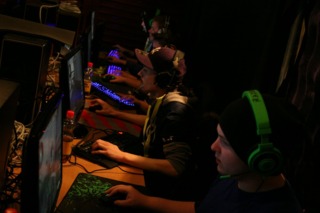
Mere days after Copenhagen Games the team won Svecup Norrköping, claiming 3,600 Euros in prize money. The very next day they won NLAN, beating the very same opponent in the final (hatersG0nnahate) and winning exactly the same amount of prize money (3,600 Euros). Offline success and the change in mentality, shifting from focusing on online competition to offline, could be seen having its effect, as the team who had once been considered onliners and cheaters were now showing an equally poor performance online as their offline performance was impressive. In the first four EMS One Summer cups Epislon only managed to place inside of the top 16 once.
A day after placing 9th-16th in the fourth EMS One Summer Cup, Epsilon removed in-game leader berg from the line-up. The team had no player to replace him with and would instead have to seek out a stand-in who could play Dreamhack Summer with them, as the biggest domestic event of the year, to that point, was less than two weeks away.
"We will try to find a stand-in for Dreamhack as it's pretty urgent, and for us a very important tournament and then after Dreamhack we are going to sit down and talk and decide who is the perfect permanent replacement."
-Devilwalk, speaking in June of 2013, on berg's removal.
A dream of finals in Jönköping
The team settled on Norwegian player cENTRYZ, who had played with jw in GOSU early on in CS:GO. Since berg had been Epsilon's in-game leader, preparing their tactics and calling them during the matches, they decided to give flusha this role for the upcoming Dreamhack tournament. Dreamhack tournaments, being the biggest on the Swedish CS calender, have often been home to more tournaments than just the main Dreamhack tournament, often housing WCG qualifiers and other domestic LAN finals. This time Dreamhack would also play host to the Swedish Championship, taking place on the first day of the event.
"Berg was the kind of caller that would call a round in freeze-time and we just went with it. flusha is a really good mid-round caller and just comes up with ideas on the fly. With flusha we basically played standard until he called something, and since we didn't have more than nine days we just went through some simple stuff so we all could play those things well. A lot of free-for-all style rounds with mid-round calls from flusha is basically how we played, and a lot of rushes of course."
-Devilwalk, speaking in December of 2013, describes his team's in-game leadership at Dreamhack Summer.
In the group stage Epsilon came out in fine form, crushing two of their opponents and narrowly beating another. Progressing from the groups put them directly into the semi-final, where they faced Delpan and ex-team-mate xelos's Lemondogs side. After losing the first map 9:16 they rallied to win the next two in close fashion (16:14 and 16:13) to reach the final. In the final their opponent, unsurprisingly, was the imperious NiP team.
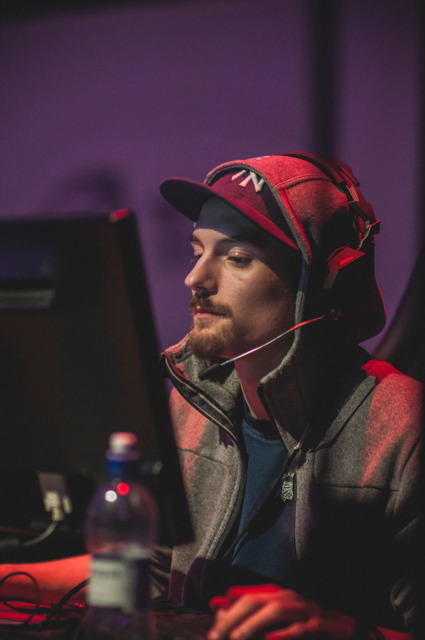
To say NiP were the favourites would not be to do justice to their level of offline dominance. The Ninjas had only lost two series offline ever, both at the same offline even (StarSeries V) and both to the same opponent (Virtus.Pro). That upset loss in Kiev, which had halted NiP's incredible 87-0 offline map winning streak, had required Virtus.Pro to play some of the most flawlessly inspired and instinctual CS:GO anyone had seen to that point in the game's history. If that was the kind of performance it took to beat NiP, and in some close maps at that, then nobody had any reason to expect Epsilon to have a chance against GeT_RiGhT and his men.
The Epsilon team, who still carried the reputation of onliners in the minds of some fans, shocked the home crowd by showing that even Norse gods could bleed, winning the opener on inferno_se 16:11. That was as far as the fairy tale would go that day though, as NiP comfortably won the second map (train) and then cruised to a series victory on the decider (dust2). Epsilon had impressed, but once more they hadn't quite delivered a performance to truly show they were contenders.
The next day, in the main Dreamhack tournament, they began play again in a group stage. The structure of this group stage would be a double elimination (often referred to by modern fans as the GSL style), meaning teams who won two matches went through and those who lost two were out. Their opener was a disappointing 10:16 loss to Curse.NA (made up of members of the team now known as iBUYPOWER) on inferno_se, the same map they had impressed on against NiP a day earlier. After winning their losers match the Swedes found themselves facing a final deciding game against the same North American side, with a spot in the playoffs on the line for both. This time they managed to win 16:10 on mirage_ce and clinch a spot.
In the quarter-finals Epsilon were drawn against Western Wolves, the Danes who had delivered them that three map defeat on Danish soil back at Copenhagen Games. This time around Epsilon had more than enough to handle Nico and company, sending them back to Denmark with a 2:0 series win. The semi-finals were a closer affair, a three map series against kennyS' LDLC pivoting on a second map overtime victory which went Epsilon's way. Just like that Epsilon were into a second final in as many days, once more to face the NiP team which had been the roadblock to every offline title in CS:GO at any event the Ninjas had attended.
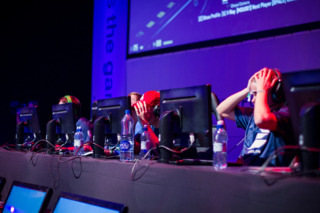
Were this a Hollywood movie then this would be the moment in which Epsilon would gather together, determined to slay the giants and prove themselves championship level players. Instead real life played out as real life often does, by the numbers and with a degree of inevitably banality. NiP came to the final in no mood at all for the events of the previous day, dismissing their would-be new Swedish rivals in two straight maps. The games weren't even close, the first was a 16:5 thrashing on mirage_ce and the second, and final, was a crushing 16:2 beat-down on train.
NiP were the Dreamhack champions and Epsilon could once more be happy to have exceeded expectations, but left knowing they were still far enough away from the top tier in CS:GO that it was tangible. All of the Epsilon players, speaking to me this month, openly acknowledged that they had almost gone into the Dreamhack final without the hope of actually winning, happy merely to have made the final.
"We didn't really care about dying and we didn't really care about making stupid mistakes. They're a hard team to beat, if we're going to beat them we have to play 100% not 95 or 90.
[...]
NiP's playstyle is kind of anti-ours, since we play a lot individual skill level and they're better than us individually. So they kind of smashed us
[...]
I think we have a lot to improve, we don't really have a proper in-game leader, since we kicked out in-game leader recently and flusha has been calling recently, but he's, he's a good mid-round caller, but he's not the pure in-game leader."
-Devilwalk, speaking to HLTV.org in an interview after the Dreamhack Summer final.
"Devilwalk was actually the first person I met at DHS on the bus headed there and he was open and friendly but he also had a definite 'We are just here to compete' kind of attitude."
-Anders, commentator for NiP TV and Dreamhack TV, speaking in December of 2013, on Epsilon's attitude going into Dreamhack.
"It felt pretty bad to face NiP in the DH summer finals as we had played them just the night before in the swedish championship finals where we lost 2-1. And at that time we weren't really experienced enough to rematch them that soon after, but we were pretty satisfied with just being in the finals so I don't think we actually felt that bad about losing by such a big score."
-flusha, speaking in December of 2013, on facing NiP in the Dreamhack Summer final.
Looking for that missing link
With those two big results, the Dreamhack result being understandably more significant than the domestic Swedish Championship run, both taking place across a two day span it's understandable that some might simply chalk the two runs up to a hot couple of days where players hit all their shots, unlikely to be repeated. Narrowing down exactly what had helped the young Swedish team in their campaigns and what had hindered them, in their finals against NiP, was not entirely a straight forward matter though.
On the surface it's easy enough to simply point to their lack of a true in-game leader. Using a stand-in often means playing more loosely anyway, as the new player won't have time to learn a large playbook of complicated tactics, but Epsilon had also been working without an in-game leader, so they had used flusha as a kind of hybrid strat caller, working with a small handful of tactics per map. Speaking this month most of the team look back on that period of time and point to the lack of a true in-game leader as what was holding them back from performing better against NiP.
It would seem that the team had already has in mind someone they wanted as their in-game leader: Absolute Legends captain pronax. The aL man had rebuffed their offer though, initially coming prior to Dreamhack Summer.
"we asked pronax but pronax didn't want to leave his team back then so we went for cENTRYZ for that LAN and hoped that pronax's team would fail and he would join up with us after Dreamhack. This was not the case as they almost beat NiP in the group stage so he wanted to stay with his team"
-jw, speaking in December of 2013, on Epsilon's failed efforts to secure pronax as their in-game leader.
Interestingly, the man they had been seeking to acquire the services of (pronax) had a different perspective on the team's Dreamhack success.
"The easy answer is that they needed an in-game leader, since that seemed to make the difference this time, but I honestly don't think that's the case. I actually think they benefited from not having someone telling them what to do at that event. I think they surprised a lot of teams with all their random pushes, that aggressive aim-heavy style, and I think they won many matches because of that. So why could they not beat NiP? I think the answer is experience. Also, the problem when you play like they did at the first Dreamhack is that it's very easy to stop if you know it's coming."
-pronax, speaking in December of 2013, on Epsilon's Dreamhack run.
Enter MODDII
cENTRYZ had more than fulfilled his role as stand-in for Dreamhack, but he had only ever been considered as a temporary option. At the beginning of July it was announced that MODDII would join up with the team as their new in-game leader. It's worth delving into the context of MODDII's career a little here, to show the expectations his addition brought to the Epsilon side. MODDII had, since as far back at late 2009, shown himself to be one of the most skilled Swedish players outside of the top two Swedish teams (fnatic and SK at that time).
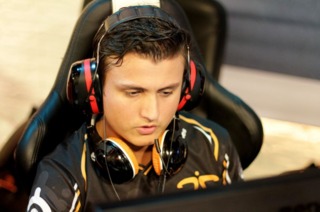
However, MODDII had also quickly garnered a reputation as a difficult personality to integrate into a line-up, being kicked from the team (MYM) he had helped elevate to top tier status within a few months of those results. When members of that line-up made statements that it had been his negative attitude, frequently complaining when his team were losing, that had motivated their decision that reputation quickly stuck with MODDII. In time his skill would impress enough that he was able to secure positions, temporary or permanent, within SK and fnatic. With the latter he had achieved a streak of 1.6 LAN victories to close out the 1.6 era.
Any hopes that the MODDII effect which accompanied that skill level had dissipated soon proved unfounded, as losing brought about the same problems past team-mates had complained of. MODDII had been in and out of fnatic line-ups twice early on in CS:GO, forcibly or by mutual agreement, depending on who you believe. His only periods of stability in his turbulent career had been playing under cArn, a leader legendary both for his teams's successes and for his aptitude at dealing with the social side of his soldiers, and under Xizt, when MODDII had been winning every offline tournament in sight. Now the prickly power player would be teamed up with a group of relatively inexperienced rookies to the top end of the scene.
Towards the end of July the line-up parted ways with the Epsilon organisation and in early August it was announced that they would become the new CS:GO line-up of fnatic.
"We are proud to announce that we are now part of one of the greatest eSports organizations ever - Fnatic. With this comes great responsibility to maintain the great reputation of Fnatic and its history within the CS scene, which we plan to uphold.
I feel a childhood dream is coming true, watching all the great teams in the past in the Fnatic organisation, and now being apart of it and its history going forward is something that's impossible to measure in how much it means to me."
-Devilwalk, speaking in the announcement post of his team joining fnatic.
August began well for the new fnatic side, in online competition they showed a performance level to match their offline success. Finishing runners-up to VeryGames in the FACEIT Cup for July and winning the SLTV StarSeries VII Qualifier, beating LDLC, seemed to suggest that the MODDII-led team had at least continued on from the step up Dreamhack's results had provided for them.
fnatic were also able to spoil the debut of the new Eastern European powerhouse Astana Dragons, which had collected together star power names from Virtus.Pro and Na`Vi into one team, winning against them comfortably in the online phase of the Mad Catz Invitational Cologne tournament.
The first offline event with MODDII
fnatic's first offline event with their new superstar would be the offline final of the Mad Catz Invitational, held in Cologne, Germany. Thanks to NiP having chosen not to compete in the tournament, knowing they'd be in the USA at the ESEA S14 offline finals until a day or so prior, the offline final came down to fnatic and VeryGames. NiP were still far and away the dominant force in CS:GO, having won all but two of the offline events they'd attended, but one should not underestimate the accomplishments of VeryGames as a result.
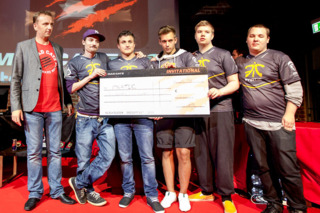
The French side had only won one tournament featuring NiP (EMS One Summer), thanks in large part to Virtus.Pro defeating NiP for them in the other semi-final, but Ex6tenz' men had finished second in four events and within the top four of a total of nine events featuring the Ninjas. NiP were the undisputed kings of CS:GO, but VeryGames were very much the crown princes of the game. fnatic faced a heavy uphill struggle if they hoped to beat VeryGames offline.
As it was, the final played out very much as context would have predicted: VeryGames had too much of everything for the fnatic men to handle or figure out a solution for. The Frenchmen won 16:8 on mirage_ce and 16:5 on dust2_se, taking home the money with relative ease. Hopes that fnatic's addition of MODDII had been the missing piece to complete their puzzle and catapult them over the last hurdle and into legitimate event contender-ship seemed to have been premature as the Swedish side went to the Techlabs Cup in Kiev at the end of August, losing there to Astana Dragons 1:2. Against the elite teams fnatic were still missing an extra gear, losing convincingly when it mattered most.
A return to Dreamhack with a familiar change
The first two weeks of September would be online competition which would serve as training for the Dreamhack Bucharest event in the middle of the month. In the FACEIT Cup for August fnatic reached the semi-finals only to be crushed by NiP there. In the MSI Beat it! 2013 European Finals they went through a disastrous spell of online form, losing four of their five group stage games and tying one with VeryGames.
The team made the decision to put flusha in the position of in-game leader again, the switch that had worked back at Dreamhack, and free up MODDII to play more of an individual game, always his specialty.
"As I said before, we have not gone through all the maps and tactics since we recruited MODDII and I think that is why we have been so inconsistent. What we have changed is that I'm now the in-game leader so that moddii can now focus on fragging.
If we are in as good of a shape now as we were at DHS? We were in really bad shape going into DHS so I don't think that says too much, and we are probably in better shape now than before DHS."
-flusha, in an interview with HLTV.org, prior to Dreamhack Bucharest
Placed alongside NiP in the group stage of Dreamhack Bucharest the team would get an early chance to test their adjustments against the world's best CS:GO team. When the two teams clashed the map was train_se, a map NiP had only ever lost four times on, only two of those losses coming in offline competition. Statistically it was NiP's best map, so things looked more than grim for MODDII and the gang.
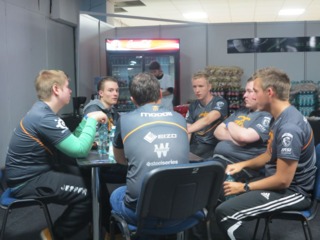
At the end of 30 regulation rounds fnatic had managed to finish with a tie, forcing overtime. fnatic won the overtime, only for it to emerge that the admins had misunderstood the rules of how overtime was to be structured, meaning fnatic were forced to restart the whole overtime and replay it. Understandably, this frustrated the young Swedish side. When they managed to repeat their feat, winning the replayed overtime, they were less jubilant over their win than they were aggressively indignant that NiP had in some sense forced them to repeat it.
Their show of displeasure with NiP, including shouts and the slamming of hands on the table, left a bad taste in the mouths of many fans, who sided with the more popular and successful team. What should have been another great offline upset win for a team over NiP was instead mired with discussion over whether fnatic had crossed the boundary of sportsmanship. Finishing atop the group fnatic drew pita and Delpan's Lemondogs in the quarter-final. With both VeryGames and NiP on the other side of the bracket, thanks to NiP's second place finish in the group, fnatic had good reason to believe a run to the finals was a distinct possibility.
Instead, this Dreamhack fnatic found themselves victims to another Swedish team's Cinderella run, losing in two maps to a Lemondogs side who would themselves go all the way to the final. A reasonably close loss in the opener on mirage_ce had been compounded with a heartbreaking overtime loss 17:19 on dust2_se to eliminate the fnatic boys.
The dark days
After almost a month of time to brood over their Dreamhack Bucharest disappointment, fnatic headed to Kiev to attend the StarSeries VII final they had qualified for. The structure of these events was for the four qualified teams to compete in a double elimination bracket. In their opening match fnatic were once more reminded that the elite CS:GO sides were beyond them in Bo3 series, losing to Astana Dragons in three maps, the decider being a bitter 14:16 loss on cache.
Surprisingly, their lower bracket opponent would be NiP, who had just lost their first ever offline series to VeryGames in the upper bracket. Facing the best team in the world fnatic were swept out of the tournament in two close, but not nearly close enough, loss to the NiP men. Hopes that these first offline tournaments with MODDII had just been some teething problems seemed almost a form of denial as in late October the fnatic men found themselves eliminated from the RaidCall EMS One Fall group stage. An overtime loss to VeryGames was respectable enough, but their loss to Copenhagen Wolves had ensured they would not progress to the semi-finals.
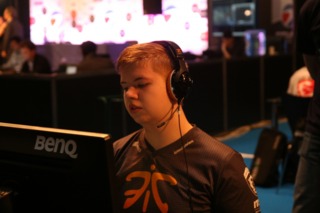
A week later and it was off to Paris, France, for ESWC. Beating Astana 16:12 on dust2 in the group stage seemed promising, but VeryGames' loss to Copenhagen Wolves in Group B meant fnatic found themselves drawn against the home team in the quarter-final. This match-up was a different prospect from the VeryGames who had thrashed them at the Mad Catz Invitational in Cologne. This VeryGames were the best CS:GO team in the world, having won StarSeries VII and RaidCall EMS One Fall, defeating NiP in series at both. This VeryGames were playing some of the best CS:GO the game had ever seen, spurred on by the devastating form of star player shox.
fnatic began the series optimistically, winning the opener on cache 16:12, but VeryGames leveled the series in seemingly no time, ramming a 16:2 inferno win down fnatic's throats. The decider was on mirage and a pattern from past events repeated itself, fnatic losing narrowly 14:16 in the big game, coming up short once more. This time they had lost to the best team in the world, but the story seemed the same no matter the opponent. Something had to change, they'd tried bringing in a legitimate superstar (MODDII) and changing in-game leader, with flusha taking on those duties again, but their team still lacked the consistency that CS demands of its great teams.
In looking for a solution to their problems, in the coming weeks, it became time for another chapter of fnatic's history with MODDII to come to a close.
"Skill wise MODDII obviously has great strengths as a core rifler in almost any team. But it is always obvious that someone needs to keep MODDII in check, and nobody on Fnatic could. All in all it felt very obvious that Fnatic with MODDII were never going to win many tournaments."
-Anders, speaking in December of 2013, on the final MODDII era of fnatic.
The man fnatic had long sought to take on the role of their captain had finally relented and accepted the offer: pronax would join as their new in-game leader.
"For quite some time we have been struggling with defining the player roles and responsibilities in our CS:GO division.
Particularly we have not achieved as good as we would like to with the in-game leadership. This has affected the chemistry of the team to an extent that we do not see any other solution than to make room for an experienced leader, something we believe we are finding in Markus "pronax" Wallsten who is joining our ranks with immediate effect."
-cArn, speaking in the statement on the fnatic site announcing pronax's addition.
The pronax story
As with MODDII before, it's necessary here to take a brief diversion into the context of pronax's career, to foreshadow the impact he would have on fnatic's core of four players. pronax had been one of many players in the Swedish semi-pro scene up until late 2009, as his Coldfrag side upset mTw 16:14 on train, one of the Danish side's best maps, in the group stage of Dreamhack Winter. Being as mTw were using two stand-ins for the tournament, and Coldfrag went on to be eliminated by the Portuguese side k1ck, who were far from a top team, it was easy enough to write that result off as a fluke.
Nevertheless, Coldfrag had, a week later, at Arbalet Cup Europe managed to do the same to the Evil Geniuses side of n0thing and fRoD, beating them 16:14 on train, as well as tying up ALTERNATE 15:15 on inferno. That hadn't been enough to get them out of the group stage, and both of their key train upsets were largely placed down to the excellent individual performances of specific Coldfrag players, most of whom were known as skilled but unproven LAN players, at the top level in the Swedish community.

Little notice was made of pronax's calling and its impact on the matches, a pattern which would repeat in the future, as his stars got all the credit for the wins and he copped much of the grief for the team's losses. Either it was BARBARR's AWPing which grabbed the headlines or Xizt's rifling, nobody looked at the man directing his players. The first true success of pronax's career was his team's runners-up finish at Dreamhack Summer in 2010. In the quarter-final they had bested fnatic, then considered the best or second best team in the world, thanks to some clever counter-play on dust2, to go with heavy fragging performances all around from the team's stars.
It's not enough to paint a black and white picture of matters though, pronax's leadership was justifiably criticised in some senses. It had been largely down to players in his team overperforming that they had been able to beat out fnatic, a fact proven emphatically as in the final they were systematically broken down in two maps by mTw, led by the tactical genius ave. With his men bringing considerably less firepower to the table pronax found himself with no real answers to the mTw side's grinding style.
pronax's last significant event with that team was a fourth place finish at Arbalet Cup Dallas, beating SK Gaming in the quarter-final but losing to mousesports in the semis. The team then decided to pick-up THREAT, who had just been removed from fnatic, as their new in-game leader, leaving pronax without a top level team. pronax would be forced to climb the competitive ladder again.
By April of 2011 the Swede had done just that, with his Rage Esports team, consisting of top Nordic talents like MODDII and kalle, finishing top four at Copenhagen Games. At Dreamhack Summer that June the same placing again came, able to defeat the lesser teams but unable to win series over the big teams. At Copenhagen Games it had been SK, at Dreamhack it was mTw stopping pronax's team. All elite teams, but a clear distinction remained nonetheless.
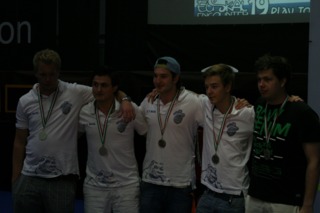
Online, where Swedish semi-pros were seemingly levels above their offline form, pronax's duttdutt mixteam were able to defeat mTw and win the somewhat questionable, in terms of prestige, LUOPGAMES tournament. Back with his real team, who were under the ESC label, pronax secured the last great placing of his career: second behind SK at GameGune 2011. The single map double elimination format of the tournament allowed pronax and company to profit heavily off narrow 16:14 and 16:13 wins over fnatic and Na`Vi, the latter on the Ukrainian's always-usually-thrown map of nuke. In the final they pushed SK but lost out 14:16.
The rest of pronax's career was not of particular note, as his superstars left him one-by-one, for better teams or retirement. At ESWC his team wouldn't make it out of the group and at Dreamhack Winter the year ended with elimination in 5th-8th. For in-game leaders the fate in Swedish CS, as THREAT and others all found out, was typically the same: your stars either joined the better teams, once you'd started to beat them, or simply retired out of frustration. With in-game leader spots filled in the elite teams (SK and fnatic) there were no career promotion prospects for in-game leaders.
What's crucial to note about pronax's career is that the same pattern repeated over and over: he would take groups of talented but typically unproven players, MODDII being a rare exception, and be the early in-game leader quarterbacking their first upset wins and playoff runs. Those stars would then get their chances in the bigger teams and pronax would be set back six months or so, looking for new talent to integrate into his teams.
Even at their peaks, his teams were usually only good for one Bo3 bracket stage upset, beyond that the elite teams seemingly always had their number. Player performances and experience obviously factor into such losses, but in the long run leadership had to be factored in when one's team are losing close maps in deciders at seemingly every juncture of significance. Leadership and calling are what put teams in position to eventually win those 14:14 maps.
In joining fnatic in CS:GO, pronax would get his first real chance to prove himself with a top level organisation.
"I definitely felt like I had something to prove when I joined fnatic, and I still feel the same way. Of course I feel some pressure, but it is not because cArn was the in-game leader before, I beat him plenty of times in 1.6 and I bet he still has nightmares because of that, however I do think I can learn a lot from cArn, and I already tweaked some small things in the way we play after listening to cArn's opinion."
-pronax, speaking in December of 2013, on expectations upon joining fnatic.
Everything in its right place
The first sense in which pronax's addition to fnatic saw an obvious initial benefit was in putting at ease the minds of the other members of the line-up, who had long petitioned the ex-Absolute Legends man to become their captain. A morale boost is certainly a good starting block from which to begin building a new culture within a young team.
"We had been asking pronax ever since we kicked berg in epsilon to join us, because we knew we would become a top tier team with him. He applies what we have always been lacking in the most and it's just well known for everyone in the scene playing that he is one of the smartest IGLs around. He's proven with us how he can make a difference, the lack of leadership and how to take over bombsites with man advantages in our style was what we were looking for, along with good timings on fakes."
-Devilwalk, speaking in December of 2013, on the addition of pronax.
"I have always looked up to pronax as I think he is a great in-game leader and I have always admired him for the work he has done in CS:GO. He hasn't really had the best individual players in Sweden, yet he has always been able to create these "top teams" that have been able to fight there at the top against some of the best teams. As I said before, our team has always been wanting pronax, ever since berg left the team after Copenhagen Games, but pronax rejected our offers all the time, to stay loyal with his [then] current team, which is something I respect a lot."
-jw, speaking in December of 2013, on the addition of pronax.
The addition of pronax went beyond simply overhauling the team's specific tactics on each map, extending over into how the roles in the team were assigned and their overall strategical approach. Epsilon had made their living off the back of wildly erratic but effective individual performances, but, as Devilwalk had noted a number of times, they fell when they needed to be able to grind out terrorist rounds with numbers advantages. One of pronax's first personnel changes was to change jw and schneider's roles within the team.
"The first thing I did when I joined fnatic was ask them how they played right then, and what everyone was doing during the rounds when they played with MODDII. I don't think I changed that much in the way they where playing except switching the roles of jw and schneider. I wanted to keep it simple and not change too much to fast, but what I did talk a lot about was when a player should take a duel and when he should just fall back, or when to push as CT and when they should not push."
-pronax, speaking in December of 2013, on his initial tweaks to fnatic.
jw and schneider both noted that difference changing their roles had on their own comfort level within the new fnatic structure.
"My role at Dreamhack summer was more or less the entry-fragger, I would say. I got to do whatever I wanted to pretty much, which is something I need to feel that I can do and that my team supports in doing. Later on in the team, with MODDII, when we were gonna start becoming this "real team" that we wanted to be, I didn't get to be the same guy anymore, schneider and MODDII got the entry-fragger roles and I dont really know what role I had within the team there for a while to be honest.
Later on now, with pronax, he knows how to use us all, he pretty much figured that out after a few days playing, and now I feel that I can reach my fully potential."
-jw, speaking in December of 2013, on how his role changed throughout his time under different in-game leaders.
"I think none of us even had certain roles at Dreamhack summer, just basic tactics, good communication and a lot of madfraggers was the key to success at Dreamhack. It's a whole different story now, I actually have a role now and we have a game plan etc. so things are a lot different now than before."
-schneider, speaking in December of 2013, on his role within Epsilon and fnatic.
Another component of note is that removing the in-game leader role from flusha's shoulders allowed that player to be significantly more freed up to play his own, somewhat unique, style of CS:GO.
"I think Flusha's strength is when he doesn't feel any pressure, he needs to feel that he is at home and comfortable else he will not do those tricks and lure in the opponent. He isn't an in-game leader, he is a lone wolf that needs some space, I would say that flusha is Fnatic's get_right. Compared to their game style he's defensive."
-maxAki, speaking in December of 2013, on his experiences observing and playing against flusha over the years.
In terms of the style of strategical play pronax would bring to the team, he had a set system in place that he would transfer over to the new fnatic. Mixing in mid-round calls with a looser style of play, which had suited the old Epsilon team, pronax seemed to be a good fit for the team still stuck at the hump of getting past the elite teams offline.
"My style of calling is very teamplay/information heavy, I try to force my opponents to rotate a lot, because that's also when they make mistakes and we can get easy picks. I don't do a lot of pre-made tactics, and the reason for that is that it's easy to read and I think that if you call a tactic from spawn 'let's do this tactic' and everyone go from spawn having that tactic in mind, what usually happens is that the CTs do something unexpected, they kill one guy somewhere on the map and your tactic is ruined.
That's why I like to have a basic concept of a few standard rounds and react to what the opponents are doing and call something in the middle of the round instead. But we do have 2-3 pre-made tactics on every map that we can use if our normal play-style does not work, so I think we can adapt to most opponents."
-pronax, speaking in December of 2013, on the style of leadership he brought to fnatic.
The short run-up to Dreamhack Winter
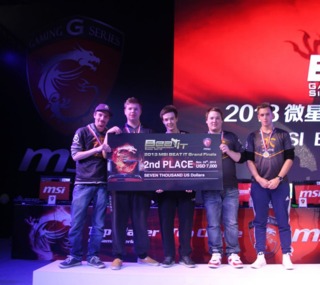
pronax had officially been brought in on the 12th of November, leaving fnatic with only a little over two weeks until Dreamhack Winter, which was set to be the biggest event of the year. Before that there would be a tune-up event for the new look fnatic side, attending the MSI Beat it! 2013 Grand Final in China. The event was light on top teams, so a close win over SK Gaming was the only result of note as fnatic cruised into the playoffs there. There then they ran through a list of teams few would recognise if listed now, eventually reaching a finals spot.
The opponent in the finals would be VeryGames, very much still the world's finest CS:GO team, even if they had been upset by a miraculous series from fellow countrymen Clan-Mystik in the ESWC final. VeryGames showed their class with a convincing two map series win, never letting fnatic get more than 12 rounds on either maps. The second place, and $7,000, was a confidence builder for the fnatic men, but they'd yet to prove anything of note in terms of offline results with their new leader.
The arrival of the first true CS:GO major
Dreamhack Winter would have been a big event in CS:GO's calender anyway, but CS:GO had lacked any true major. Where in CS 1.6 events like the IEM World Championship, ESWC and WCG stood out on the calender as events with the highest first place prize money, qualification systems every team was keen to battle through and historical significance extending back through CS history, CS:GO had no such event upon which to pin potential world championship status. CS:GO had instead survived on a regular diet on medium sized events, with a first place prize rarely exceeding $15,000.
With Valve having set in place an initiative to allow fans to buy keys, which gave them boxes to open, potentially containing unique weapon skins, the community response had been enough to raise several hundred thousand dollars in funds. The developer had then assigned $250,000 of that money to Dreamhack Winter to use as the prize purse for their tournament, creating the first ever true major in Counter-Strike: Global Offensive.
First place stood at an incredible $100,000, ensuring every CS:GO team in the world had their eyes firmly affixed to the dates of November 28th to 30th as the times their side must peak, as true sign of a major as one can hope to set in stone. Even team likes NiP and VeryGames, who had been the best sides with staggering consistency throughout CS:GO, knew that if they succeeded in all the other tournaments but fell at Dreamhack then their CS:GO careers would be missing something vital. The Dreamhack SteelSeries CS:GO Championship was do or die for even the greats of CS:GO.
Off the back of fnatic's relatively easy run through the MSI Beat it! 2013 Grand Final, nobody outside of the fnatic organisation had reason to believe the team were legitimate contenders for a finals spot in Jönköping, all instead looked to the established top trio of VeryGames, NiP and Astana Dragons, in that order, to battle for the first CS:GO major crown.
A potentially troublesome group stage navigated with ease
"[pronax] has proven to be a solid leader who can improve teams who are stuck on fnatic's level, but he has yet to field any serious title contenders at major events, which might put a cap on how well fnatic can realistically expect to do unless we get another crazy performance out of their star AWPer, who is also my player to watch for the Black and Orange squad."
-lurppis, writing in his preview for the group stage of Dreamhack Winter.
"MSI [beat it grand finals] really helped us, because we got an instant test as to how we play as a team and how it works. We only had like five days with pronax before and it was 8 hours to 10 hours gaming and we did really well vs. veryGames, NiP, in practise, so it felt good."
-schneider, speaking in a pre-final interview with HLTV.org at Dreamhack Winter, on fnatic's form heading into Dreamhack Winter.
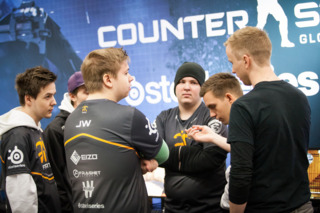
Placed in Group A, fnatic looked on paper to see a test of their level early on, as their group was considered one of those with a lot of parity between the teams contained within it. Na`Vi had managed a series win over Astana Dragons at Techlabs, before having the favour returned, and Clan-Mystik had recently shocked the world by winning ESWC, beating VeryGames no less. In their opener fnatic comfortably handled Na`vi on mirage. The winner's bracket game had them paired with the aforementioned French team and fnatic made light work of them, pushing them aside 16:6 on inferno to reach the quarter-finals.
The problem for fnatic was that Clan-Mystik's losses, and eventual elimination to surprise playoff qualifiers LGB eSports, coupled with Na`Vi's quick elimination, meant most saw the results of the group as Clan-Mystik being flukes in their ESWC win and Na`Vi being a troubled team. It was hard to gauge how good fnatic actually were, they simply seemed to be the team who had stayed at a solid level, while the others had been mired in the much of poor performance.
A seemingly simple quarter-final surprises
The quarter-finals must have been a shock for pronax's men when they rolled around. Rather than having to face the might of NEO and TaZ's Universal Soliders, they were paired up with Recursive, a French team almost solely known for containing exiled star AWPer kennyS. The story-line of the French side had been their impressive CT side comebacks on inferno. fnatic were clearly not believers, allowing inferno to come out as the first map of the series.
The Swedes ran up a big score, but the French side did start to mount one of those comebacks. It proved short lived enough, fnatic moved on to a second map. Here things got a little scary, with kennyS' men somehow winning dust2 16:13. If that suggested the decider would be some thriller then it delivered for a little while, but fnatic eventually secured a semi-final spot with a 16:10 win. Again, the Swedes were moving through the tournament but there was always a knock to be placed on them, in this case losing dust2 to a team next to nobody would even place top 10 in the world.
"That game I think we took it a little bit too lightly, we won the first map very very easily, it was like too comfortable to be good for ourselves, then we got a lead on dust2 and then just stopped playing our game. Then it's just really hard to find yourselves again after that. But finally, in the end of train, we found ourselves and we managed to win, luckily."
-schneider, speaking in a pre-final interview with HLTV.org at Dreamhack Winter, on fnatic's quarter-final vs. Recursive.
compLexity bring anything but to the semi-finals
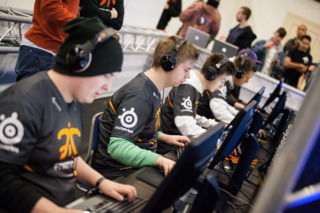
The semi-finals of fnatic's side of the bracket had been expected to see the Swedes facing VeryGames, the team who had already eliminated them from the two previous tournaments. Instead, thanks to an upset on inferno from coL in the 30th round, VeryGames had ended up transposed into the other side of the bracket. That left coL and Astana Dragons, the latter considered the consensus third best team in CS:GO, as the teams battling for the semi-final spot opposite fnatic.
When coL continued to upset the bigger names, slaying Astana Dragons in a thrilling three maps, one could be forgiven for thinking it was fnatic's lucky day and not coL's. fnatic had amazingly found themselves a favourite headed into the semi-final of the year's biggest event. Two map wins here and they would be assured of a minimum payout of $50,000, the prize for second place. Every member of the team was confident, though still respectful of coL's blistering form to that point in time.
"Personally I wanted to face Astana Dragons, because I felt like they were a lot easier to beat, especially with pronax in our arsenal. We did feel happy either way, because we felt so hot that we could win the event, so it didn't matter who we faced."
-Devilwalk, speaking in December of 2013, on meeting coL in the semi-final.
"Of course I preferred to meet coL but after standing behind them and watching their game I was really impressed and a little bit worried because they were playing out of their minds, just insta-headshotting all the time."
-schneider, speaking in December of 2013, on meeting coL in the semi-final.
coL's form from the group stage and quarter-finals seemed to completely desert them on the final day, fnatic stomped their transatlantic counterparts into the ground with emphatic 16:7 wins on both maps. Members of coL would later surmise that they had tunnel-visioned too hard on specific anti-strats to what they had seen from fnatic, which when applied against different tactics from the Swedes left the the North Americans falling flat on their faces.
"We only scrimmed fnatic one time on inferno, I think it hurt us more than them since to me it didn't feel like they did anything that happened in that scrim. Although that could have been a safety measure in assuming we knew how they played so they changed stuff up on the fly when they played us.
[...]
We expected a tough match although a bit closer, we knew winning inferno was a really important since we weren't on an equal level to them on mirage and train. I think the match would of been way closer if we'd started CT since we were on our way to a 10-11 round half but obviously when you only get 1 round on T side you leave yourself no wiggle room. They played really unconventionally on there as CT and it really ruined our strats and we may have looked into how they played too much when we should have played our own game like we did vs. everyone else."
-semphis, player for compLexity, speaking in December of 2013 on how their practice against fnatic compared to their semi-final games.
Such a convincing victory spoke to both the tactical approach of pronax and his team's ability to execute their game plan.
"I didn't really follow him in CS:GO but I remember some of his other teams in cs 1.6, he seems to be an unconventional caller that will try new and risky things. He was probably the main reason they won DreamHack in my opinion assuming he's the one that called all the over-rotates vs. us on CT sides, big risks, big rewards."
-semphis, speaking in December of 2013, on pronax's calling.
"We were pretty confident against coL, especially when we knew they were watching demos of us and preparing a lot for the matchup. All we did was watch them in one game and came to the conclusion that they want to do "full-round tactics", with smokes and molotovs etc. So what we decided to do was to play the opposite of what they saw in the demos of us as well as ruin the tactics they were trying to do by pushing them aggressively. I don't think we thought it would be that easy, but we were pretty confident."
-jw, speaking in December of 2013, on facing coL.
"After watching them play against Astana Dragons on inferno we saw that they had really good smoke/flash tactics, so we just decided to play the inferno CT side very aggressively. We knew that swag was always banana on their standard round, and when they decided to attack bombsite A they did not leave a lurker to hold the backstab position most of the time, so every round when devilwalk and I pushed out banana and did not see swag there we knew that they would go for the A bombsite."
-pronax, speaking in December of 2013, on his formula for beating coL.
fnatic were through to the final of the biggest CS:GO event ever and they'd yet to face a single elite level team along the way. Even the dominant fashion in which they'd trampled over coL in the semi-final didn't build too much hype for the Swede's finals chances, as coL's poor form in the series meant the match looked more like only one team had shown up, so it was difficult to know if fnatic were just that good or coL were just that streaky.
Matters were made worse in that the bracket draw meant the other semi-final was NiP vs. VeryGames, the two best teams both in the world and in CS:GO history, facing off in what seemed like the "real final". In renewing their rivalry the general sentiment was that whoever won that match would then comfortably handle fnatic in the final and take the biggest CS:GO title yet, a crown seeming crafted precisely for either team's head.
A Dreamhack finals rematch with the Ninjas
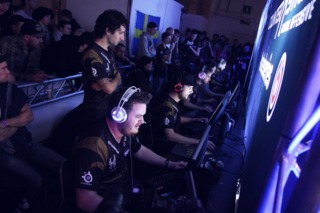
NiP emerged from the battle of the gods in the other semi-final and were considered massive favourites for the final. Less than six months earlier, nine of the ten players in this Dreamhack Winter final had played the final of Dreamhack Summer, with the five players on the NiP side winning in dominating fashion. Back then fnatic had just been happy to be there, by their own admission, and if they were to have this Dreamhack run written up as anything but another Cinderella run, this time coupled with the luck of some bracket draw, they would have to prove themselves against another in form NiP side intent on taking another title.
When the maps came out it was easy to imagine NiP would waltz off the stage to a celebration before three maps were up. Map one would be dust2, where Recursive had bested fnatic and NiP had just beaten VeryGames; map two was inferno, where NiP had only been beaten by VeryGames and the decider was set to be train, NiP's best map and a place they had only ever lost five times in the history of the game.
In my role as the expert on Dreamhack TV's analysis desk I confidently predicted a 2:0 series win for NiP, with fnatic failing to even reach 10 rounds on either of the maps. The thinking behind this was that NiP had that same day defeated a very dangerous VeryGames team, mixing in a little tactical adaptation we had not previously seen from them, and that the map draw made the mountain before them a seemingly impossible climb for fnatic.
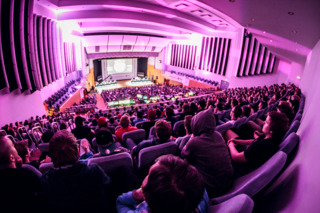
That fnatic had lost to Recursive on dust2, while NiP had just beaten the best team in the world (VeryGames) there made it hard to imagine fnatic taking that map. Still, in the quarter-final NiP had narrowly lost dust2 in the opening map against LGB-eSports, so there was a glimmer of hope for fnatic to latch onto. If they did win dust2 then they stood a chance on inferno, where VeryGames had shown NiP could be beaten, but where NiP had also repeatedly proven themselves strong during the event. If fnatic could somehow win on dust2 then maybe they had a chance to take the series in two maps, but that was a huge if.
If the series went to three maps then it seemed certain fnatic's chances would disappear as the third map loaded up. The version of train being used was the valve version, not the special edition used all year long, but fundamentally it was the same map NiP had been godlike on all year, losing only twice times on offline. One of those instances had come against fnatic, but it had been the MODDII-led fnatic and in a group stage game, in overtime at that.
It's rarely a good idea to place too much emphasis on group stage games, as the best teams play such a heavy tournament calender that they are primed to peak as the tournament progresses, while lesser teams are used to having to claw for every point from the very beginning, since they are much more likely to be eliminated early on. I wasn't the only one imagining fnatic's chances were considerably slim.
"I don't see NiP losing on de_train, so for fnatic to have a chance in this series they would have to top their opponents on de_dust2 and de_inferno, a tall order against NiP.
[...]
I think the youngsters of Patrik "cArn" Sättermon will take a map, but anything else is a tall order. A lot will depend on the leadership battle between Wallsten and Richard "Xizt" Landström, which is the only part of the game where I think fnatic can have an edge.
I fully expect NiP to win the $100,000 grand prize and get a happy ending to their TV6 documentary, but to do that they'll have to go through a red hot fnatic squad, and avoid the kind of stomping coL received."
-lurppis, writing in his HLTV.org preview of the final.
"After our practice games I knew they could play well, but after the practise I would have never expected them to win."
-NEO, legendary winner of more CS 1.6 majors than can be counted on a single hand, speaking in December of 2013 about his thoughts on fnatic's finals chances after practicing them before the event.
"Honestly I thought NiP was going to 2-0 them. Not to take anything away from fnatic but it really seemed like NiP choked on d2 and the series could of been over in a 2-0 victory for NiP."
-semphis, speaking in December of 2013, giving his thoughts as fnatic headed into the final.
Inside the fnatic camp the belief was there that they could win. It's expected that players will state as much before the game begins, to buoy up the confidence of their team-mates even if they don't believe it themselves, but fnatic did seem oddly calm in facing the monstrous task before them. Devilwalk matter-of-factly told the crowd that fnatic would win, even promising to drop his pants if they did.
"I don't think I said anything special before the final, I just talked about the game, what pistols we should do and how we should play the match in general, like I always do. cArn however kept telling us that we could win this, that we were as good as NiP, he probably said stuff like that at least 100 times. And even if it does not seem like him saying that would have mattered, I do think it helped to know that someone like him, who has won pretty much everything there is to win in CS, really believed in us. I think that made us believe in ourselves as well."
-pronax, speaking in December of 2013, on what was said to the fnatic players before the final began.
"It was pure pleasure, they had all the hype to win and we didn't have a drop of sweat of pressure. We knew what we did wrong in the summer finals and we corrected that problem, never giving up and always believing in each other. We felt like it was maybe a 50-50 match, I know people felt otherwise.
We had practiced against them a lot and played very well in practices. pronax is a caller that's super comfortable playing against people he has been practising against, so we had extra confidence as he did. I knew xizt might have an extra chunk of pressure by facing his childhood friend on the stage."
-Devilwalk, speaking in December of 2013, on facing NiP in the final.
"you are always a bit worried going up against NiP but we preferred to face them over VeryGames so we felt pretty good going into the final. I personally didn't think about the DH Summer finals at all, I don't know about my team though."
-flusha, speaking in December of 2013, on facing NiP in the final.
"we have felt for a long time that we can match up pretty well with NiP, we didn't even think about DH summer. As I said earlier, the DH summer final was nothing for us, the loss itself, we were so happy at DH summer for just having been in the final. This time it was a whole other story, this time we all wanted and felt that we could win and we were not fully satisfied with just being in the finals. We wanted to win so badly."
-schneider, speaking in December of 2013, on facing NiP in the final.
"When you go up on the stage and see all the people coming in, you feel a little bit nervous, but I think that's just natural. It is a big moment in your life and you should feel a bit nervous. But while you are in the game and you are playing, you don't feel it that much, all you want to do is win the rounds and that's all that matters. I didn't think at all about the Dreamhack Summer final, I was just focusing on the match we had in front of us."
-jw, speaking in December of 2013, on facing NiP in the final.
Devilwalk even dropped a little humourous jab in on the NiP fans. As he was being interviewed the fnatic captain heard the crowd chanting for friberg, entry fragger for NiP, and so he quipped: "I know friberg is good, but 'jw best'". On that note the finals soon were underway.
"I do feel some pressure while playing, as I've noticed that whenever I do something bad, I get 100 times more flame than the others, but also when I do something good I get 100 times more positive feedback then the others. But that is just a bad habit that I feel pressure I think. It's not something I want to do, but I know my potential and I know I can play as good as these guys and that's all that matters."
-jw, speaking in December of 2013, on whether he felt any additional pressure due to Devilwalk's comment.
"I also noticed a very startling change in Devilwalk when I caught him after they made the Grand Final. He was just headed off to the Dream Arena and I jokingly said “Now you just need to beat NiP” to which he said 'We can.' Maybe I am reading too much into it, but I think the mental change of the players played a big part in this too."
-Anders, speaking in December of 2013, on the difference in fnatic heading into the Dreamhack Winter final.
fnatic were being pounded on early in map one, NiP were in such dominant force on their terrorist side that they went into the half up 12:3. With in form players of the quality NiP possessed it was fully expected they would close out the fnatic upstarts and take the first map comfortably. The second half began ideally for fnatic though, winning the first few rounds and putting together a streak of their own. NiP kept biding their time, expecting openings to win rounds to come, but after 12 rounds of fnatic's T half NiP had only managed to put an additional round on the board, with fnatic now in the commanding position of being up 14:13.
flusha's miracle
NiP immediately canceled fnatic's first lead of the map, winning with a weak buy. With the game tied at 14:14 it was fnatic and pronax's calling that would decide the rest of the map though, seemingly, as fnatic had more money and the easier side. The 29th round of the first map is a round which will live forever in the memories of both teams. fnatic were preparing themselves for a split attack into the B site. f0rest killed two of them who had pushed out of middle before flusha could respond by killing the NiP man, putting fnatic at a 3v4 disadvantage. Devilwalk moved into B and evened up the numbers at 3v3.
With the site taken and almost a minute on the clock fnatic decided to play it out slowly, not going for the plant but waiting to see if NiP would venture a push in through the door or window. Instead NiP were sending a man through T spawn to flank fnatic's players from the tunnels. jw bizarrely chose to jump up at the window, being immediately killed and putting fnatic down 2v3 without the bomb down. As Xizt locked off the B tunnel, without being seen yet, NiP knew the remaining two fnatic men could only be somewhere within the body of the site itself.
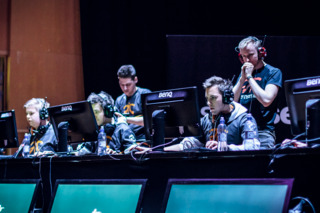
Xizt began to move to entry the site from the tunnels, while the other two NiP players flashed and headed towards the window for their entry point. flusha inexplicably, seized by a moment of inspiration, chose this precise moment to push out of the door himself and look immediately to his left, managing to catch both NiP players there not looking directly at him. With two quick kills he had flipped the advantage into fnatic's favour, though they still had Xizt to deal with in the tunnel.
Devilwalk had his crosshairs placed on the exit point for the tunnel, being as that was the only location left for Xizt to be occupying and when he headshot the NiP IGL everyone in the arena was hit with the impact of what had just transpired, not least a NiP side facing elimination with almost no money. fnatic were going to win map one, somehow they would lead the series going into map two. 16:14 dust2 went to fnatic. Flusha's inconceivably large Swedish meatballs allowed proven pivotal in turning what would have been a narrow loss into first blood for the underdogs.
"The only thought I had was that I had to take out the two guys outside before they could retake the site together, so I just went for it and luckily for me they were just about to enter the site through the window, so they both had their backs to me."
-flusha, speaking in December of 2013, on his 2v3 antics against NiP on dust2.
"I actually thought that we would lose dust2, our CT side on dust2 had been good in practice, but our T side had been very bad. I thought that we could easily win inferno if we got our game going since I think inferno was one of our best map going into Dreamhack."
-pronax, speaking in December 2013, on fnatic's chances on the first two maps.
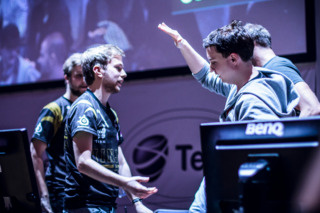
If fnatic won in two maps, and quickly, perhaps they could escape the stage with the title. That was their best chance and they had to put everything they could into winning inferno, the second map, before NiP could get rolling again. The difficulty in beating great teams in best of three series has always been that the great teams can find a way to win on any of the maps, regardless of whose pick it was, and thus the underdog team can't allow games to go on for too long, because eventually the stars of the great team will wake up and start playing like stars.
For underdog teams upset wins in Bo3s need to be smash-and-grabs, in and out with as little time for the favourites to react as possible. The longer the game goes on the more time for the better team to figure out what they're doing wrong and start playing like the better team. That principle seemed to be on full display in the second map, as inferno was all NiP all the time. The Ninjas dominated 16:6 to send the series to a third map. While NiP could reason that they'd been close to winning the first map, fnatic could not make any case for having been within any kind of distance of winning the second.
Entering the NiP graveyard
The third map was the aforementioned mighty train, home map of NiP. Many a team had seen their tournament hopes crushed, caught in the harrowing maze of trying to figure out which site favoured their attacks and how to break the seemingly impregnable defensive lines of NiP. It's always been a factor I've considered in favour of VeryGames that they simply didn't play train anyway, so they never had to worry about such matters after losing twice early on the map to NiP in their rivalry.
NiP had only lost on train twice in an offline BoX series in CS:GO history, to Lemondogs at Svecup Västerås and to Na`Vi in the StarSeries VI final. What's more, NiP had displayed the full breadth of their awesome power on the map earlier on in the tournament. After stealing the opening dust2 narrowly, much like fnatic, LGB-eSports had gone into train as the second map of their quarter-final against NiP.
After taking nine CT rounds perhaps the young Swedes imagined they had a chance to win the series in two maps, those thoughts proved misguided at best as NiP moonwalked across their souls in ice hockey skates, winning 10 rounds in a row on their godlike CT half to level that series. fnatic would have to do what only two teams in history had ever done, and with $50,000 resting on their ability to accomplish such a feat.
There was also the matter of past history. When fnatic, back as Epsilon, had played NiP in the Swedish Championship and Dreamhack Summer finals, on back-to-back days, they had lost on train twice. The latter, the winning map for NiP in the Dreamhack final, had been a devastating 2:16 loss for Devilwalk and his men. Here they were, on the Dreamhack finals stage again, facing NiP again and this time with considerably more money resting on a single map than any team had won for any tournament in CS:GO history. If fnatic were to win their first CS:GO title it would be in memorable fashion.
"They always had a strong train so yes, sure."
-NEO, speaking in December of 2013, on whether he thought NiP would win the series once it reached the decider on train.
"Well I think we all knew how good NiP was on the de_train_se but this new version of train really didn't have me with a clear favourite in mind, Although for 100k on the line and fnatic having new players I still thought NiP would take it due to nerves and pressure."
-Semphis, speaking in December of 2013, on whether he thought NiP would win the series once it reached the decider on train.
"We have always been equal on train, people have always known how good we have been on train, but seeing we are probably one of the best teams in the world on new mirage we knew train would be the map. Still, I think they played the map wrong, seemed they only played new strategies and didn't play a single round that had been working in the past, and they played a lot of "set Strats" which is where we feel most comfortable playing against, so as the game developed we felt really strong, and with cArn calming us down beetween the games we had extra motivation."
-Devilwalk, speaking in December of 2013, about his team's match-up with NiP on train.
"We were very confident on train, but we also knew that NiP had a very good train. We have beaten them on it before so I think that helped our confidence quite a bit, and while being in the game we knew that we couldn't just stand defensively and wait for them to do their thing, so our main plan was more or less to come up with new ideas all the time. So schneider and I came up with some sick ideas every round, pretty much, like pushing up lower and having three inside, sneak instantly into t main, stack inside pop and weird ideas like that, and it really worked out."
-jw, speaking in December of 2013, about his team's match-up with NiP on train.
"Our practice results had also been really good on train, but in practice it was always our t-side on train that was really good, we usually never let any team get more than 5 rounds when we where on the t-side, but we usually only got like 7-8 rounds as CT. But I really liked our chances in the final against NiP, even if most people thought we would get destroyed, we were very confident in ourselves and we knew that we could win. So I thought that whoever wins it would be a 2-1 result."
-pronax, speaking in December of 2013, about his team's match-up with NiP on train.
An unusual rule for the tournament saw that losing team of the second map selected the side they started on for the deciding map. This worked in fnatic's favour, allowing them to select the CT side for train. train is the most heavily CT sided map in CS:GO, so at the very least fnatic would get a chance to give NiP their best shot before having to run up against NiP's own CT side.
More than simply give their best shot, fnatic produced one of the best offline train CT performances ever recorded against NiP, winning a monster 13 rounds. NiP were the gods of train CT side, but could even they produce 14 out of a potential 15 rounds to seal the championship in regulation? For the first time in the series the favour had shifted over into fnatic's hands and suddenly all the pressure lay around the necks of every man in a NiP jersey.
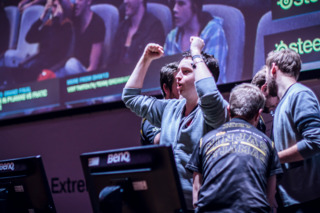
At this point it is worth bringing into the contextual picture the reality TV show following NiP at Dreamhack. The most composed team in CS:GO history had lost the previous three offline tournaments they had played, and they had been being followed around by a TV crew from the Swedish channel TV6. With emotional star GeT_RiGhT, the finest player in CS:GO history, uncharacteristically off form for those tournaments it was left to the pundits to speculate on whether or not the presence of the cameras, and the new kind of pressure they brought into the equation, had played any role in GeT_RiGhT and NiP's woes.
If those concerns had been in NiP's minds at all they seemed to have cleansed themselves of such worries at Dreamhack, with GeT_RiGhT on course to win the MVP for the tournament, playing at the kind of level which had built his immense CS:GO reputation as the best player. What's more, in the aforementioned LGB-eSports CT shutout on train, GeT_RiGhT had been the dominating force, completely crushing the opposite without any hope of competing. NiP's star was back on course and it seemed that with that guiding light by which to navigate that all things were once more possible for the Ninjas.
"It was okay I guess, I didn't think we would have such a good CT side as we had but I knew we could play well on de_train. We had some minor problems with pop/T-main but we managed to work it out. I actually called a lot of rounds for what we should do, like basic "Go 3 aggressive inside and just 2 outside" and "2 pop and keep T-main smoked the whole time" and it worked everytime and I think nip wasnt ready at all for such "random-play"
-schneider, speaking in December of 2013, about his team's match-up with NiP on train.
The $50,000 1v1
When the second half began, with NiP on CT side, the favourites knew that securing the pistol round was a must, else the series would be, for all practical purposes, already lost. The round opened with fnatic pushing everyone outside, while NiP hand incorrectly gambled to have three inside. In a flurry of action jw took the first kill for fnatic, NiP killed two themselves and then two more kills from jw put fnatic at a 3-to-2 man advantage. With Xizt as the third man inside, NiP had the slight jump on fnatic, as the NiP IGL pushed into the pop dog area and killed only, only to be taken out by the other fnatic player who was in close quarters to him.
GeT_RiGhT found himself left in a 1v2, with only 28 health points and knowing he must win the round to keep NiP's chances of winning the first CS:GO major alive. GeT_RiGhT couldn't have known it, entirely, but one of the fnatic men had only 4 hp, while the other was at the full 100. Still, this was GeT_RiGhT, one of the best clutch 1vX players in CS history, particularly CS:GO history. These are the kinds of rounds he had built his legend and his unique playing style off.
Meeting schneider at the inner site, who had rotated there, GeT_RiGhT took a shot and dropped to 17 hp. The bomb went down outside and pronax moved over to hide towards the back alley area. GeT_RiGhT's incredible intuitive powers told him not only that the fnatic IGL would be there, but even from which side to attack him. The NiP star took out pronax without losing a point of health, suddenly he was facing a fnatic man with only four health but the bomb planted. Did GeT_RiGhT know his opponent was low? Could his eerie powers of intuition again lead him to his opponent's location?
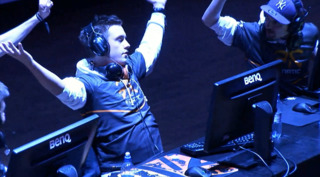
The bomb was planted right in the middle of the outside site, on the T side of the middle train. schneider could not play away from the bomb, he knew he couldn't risk GeT_RiGhT being allowed to defuse it. Pushing up to the CT side of the bomb train schneider took up a position behind a yellow drum there. GeT_RiGhT stopped defusing and began walking around, heading closer and closer to schneider's position. In one of the most baffling moments in CS:GO history GeT_RiGhT moved right up to the position schneider was in, the commentators even later stating that the NiP player could have seen the fnatic player with four health points on his screen, yet somehow missed any visual signal that he had found the fnatic man.
With time running out GeT_RiGhT went back to the bomb and began defusing, schneider able to move out and shoot him in the back of the head while the NiP star defused. Lifting his hands into the air, schneider knew, putting his team up 14:2, that he had all but secured the map, the series and the title for his team.
"That moment had so much pressure on me. When pronax died and I had 4hp I just had to take a chance and let him either really defuse and me lose or him fake defuse and hope he doesn't find me. Luckily for me, he did the latter. The moment I won that round was just unreal, I was so immeasurably happy and I just knew that I had won us the game at that point."
-schneider, speaking in December of 2013, on his 1v1 train T pistol win against GeT_RiGhT.
"I was just nervous watching pronax and schneider playing 2v1, one just sneaking around while the other one looking for him. When GeT_RiGhT took out pronax I just sat there hoping for schneider to not fuck this up. :D When GeT_RiGhT defused the first time I just said to schneider in teamspeak 'Probably no kit' and I think schneider just thought the same. Then, hearing the second defuse and schneider seeing his back I just felt happiness. Only 2 low buys away from winning DHW'13 and $100,000."
-flusha, speaking in December of 2013, on schneider's 1v1 train T pistol win against GeT_RiGhT.
"That is most likely the only round during any of the three maps where I was actually nervous. We had a pretty big lead but I know what NiP can do to you if you give them the opportunity, it felt like everything came down to that pistol round."
-jw, speaking in December of 2013, on schneider's 1v1 train T pistol win against GeT_RiGhT.
If the flusha dust2 round would be burned the memories of both teams, then this 1v1 may well be the source of nightmares and sharp awakenings drenched in sweat for the NiP players. Now they needed more than world class play, they needed a miracle. As it turned out, Dreamhack run out on its dispensation of miracles for this one tournament.
From there it was an inevitability and soon fnatic were jumping up and down, celebrating victory over the best CS:GO team of all time, in the biggest CS:GO tournament of all time. $100,000 and all the kudos of victory showering down on them. Three of them had handed NiP the first official online loss in CS:GO history, now they played a role in handing NiP their most crucial official loss in CS:GO history. The ghosts of Dreamhack Summer were gone, fnatic had beaten an elite team and won CS:GO's first true major.
As I capped the broadcast by stating: NiP were a team of history, but fnatic were a team of destiny!
"I really do think that the final could have gone either way, but what made us win Dreamhack was that we really worked hard to improve during our practice games leading up to the tournament, we believed in each other and we had the support from fnatic, especially cArn, who stood behind us during all of the matches."
-pronax, speaking in December of 2013, on winning Dreamhack Winter.
"Can't say a lot more than happiness and a lot more feelings. We had just won an international CS:GO LAN tournament and it was the biggest tournament as well, versus NiP, who have dominated the CS:GO scene for most of its history. Also showing the audience that were all cheering for NiP that there's another swedish topteam out there."
-flusha, speaking in December of 2013, on winning Dreamhack Winter.
"It was unbelievable, it was the best feeling ever. I still can't believe that we actually won it, and at that point it was all joy and happiness. Thinking back to it and watching clips of it, it feels like a dream."
-jw, speaking in December of 2013, on winning Dreamhack Winter.
"Just speechless.. didn't find words, just threw down the headset and jumped and screamed :D It was unbelievable, even today, almost one week after, it still hasn't sunk in. Probably the best moment in my whole life and I have had a lot of moments!"
-schneider, speaking in December of 2013, on winning Dreamhack Winter.
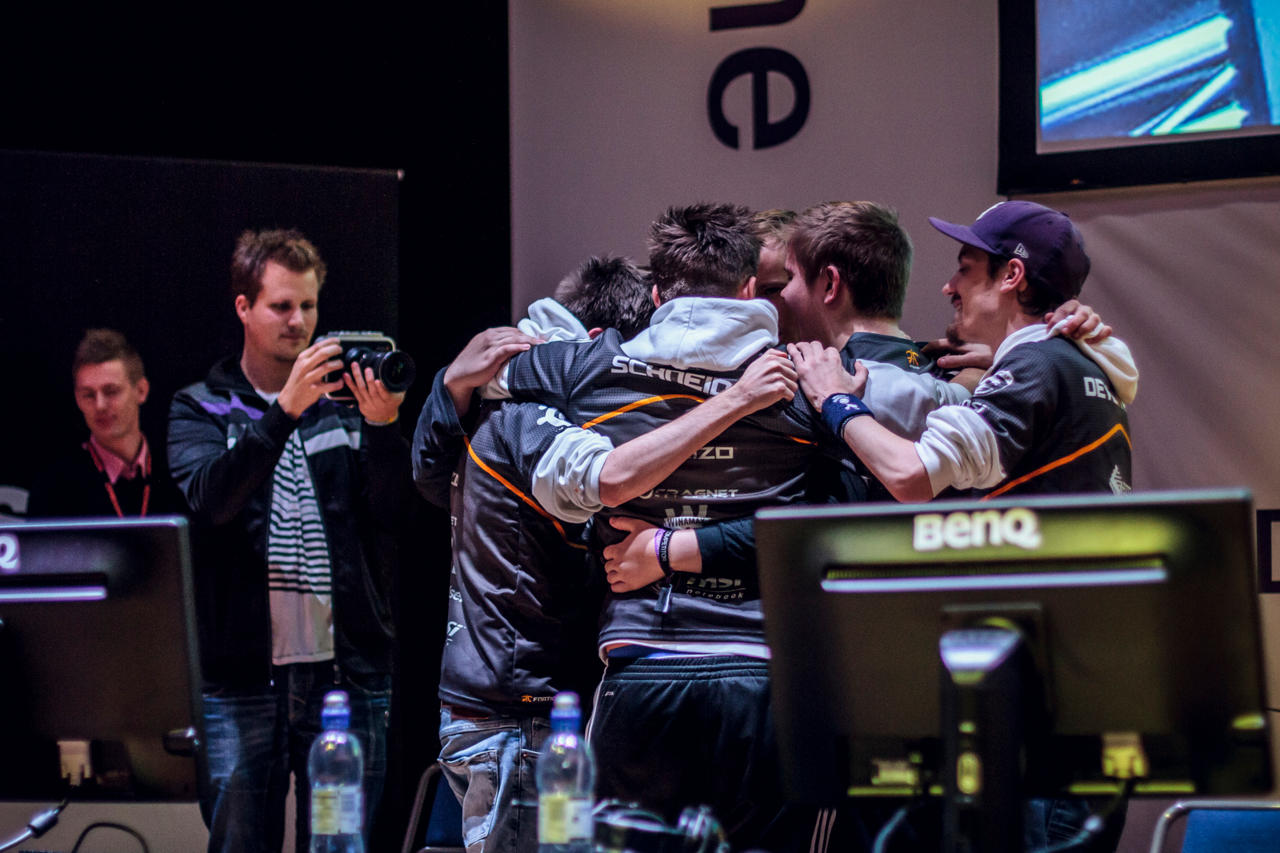
Photo Credits: Rikard Söderberg, Dreamhack, fragbite, fnatic, Brita Jonsonn, Helena Kristiansson, Hampus Andersson
Got a news tip or want to contact us directly? Email news@gamespot.com
Join the conversation